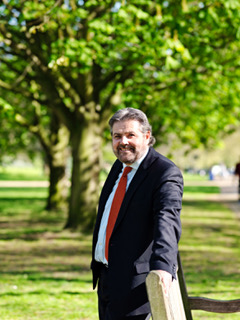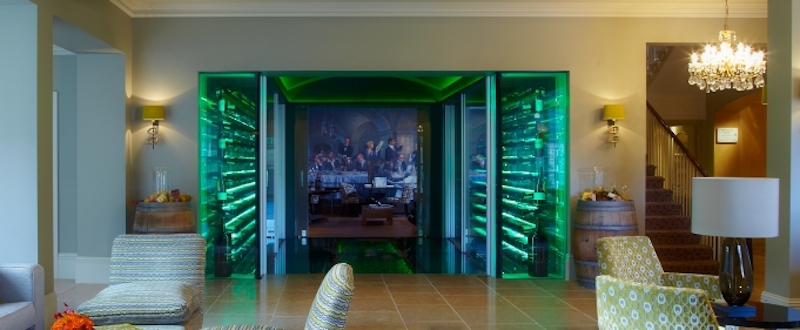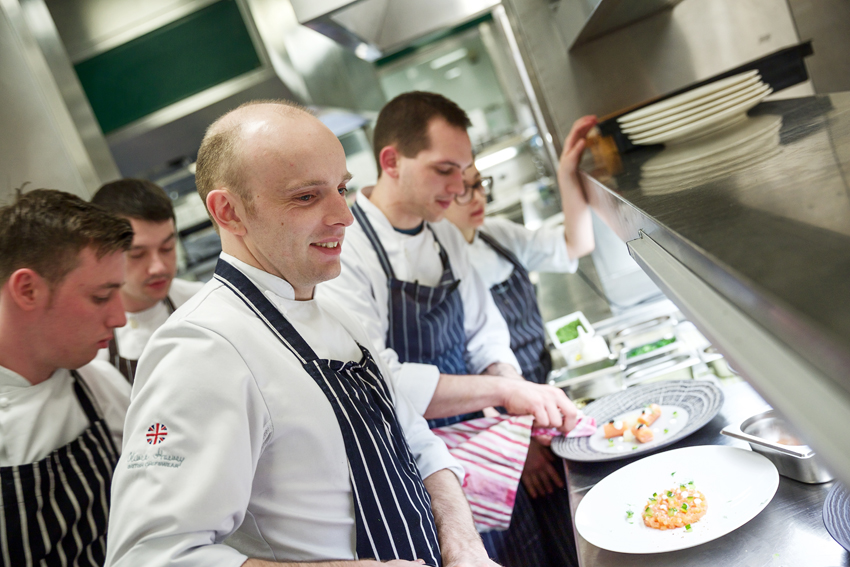Andrew McKenzie fell in love with the hotel industry when, as a young boy, he successfully worked as a hall porter at a hotel in his home town. After entering the hotel trade full-time Andrew embarked upon a journey which led him to The Vineyard Group. Here, Andrew shares his knowledge and experience of near twenty years at the helm of this prestigious hotel group.
 Tell us some personal and professional background about yourself
Tell us some personal and professional background about yourself
Having started on a paper round, I graduated at the age of thirteen to being a hall porter in a hotel in my home town in Scotland – The Royal Hotel in Bridge of Allan – I learned very quickly that if you are nice to people then in return they may give you some money; I made more in tips than I did in wages! That principle is the essence of hotel keeping.
I came from a typical Scottish working class, council house background but found the glamour of top hotels infectious – the seductive imagery of silver, crystal and jackets with tails – After leaving school, I started working at hotels around the UK, with the hotel companies getting gradually smaller – from the world-wide Inter Continental brand through to De Vere through to Shire Hotels (who owned The Stafford in London as part of Daniel Thwaites).
While the property at The Vineyard was being built, I came on board as second to the MD to originally run Donnington Valley. As it turned out the top position became available within a month after the opening, so around 19 years ago Chairman Sir Peter Michael made me Group MD and I’m still here and enjoying (nearly) every minute!
How has the market evolved for The Vineyard?
Our Chairman (Sir Peter) has a saying about his business: 100 by 100 in that it should be 100% family owned and last for 100 years. We’ve had our share of tough times here and that long view has been critical to lasting success. We realised that we needed to punch above our weight to sustain ourselves – wine and gastronomy in that discerning individuals would be at the heart of the identity but also offering a country retreat for small groups within city corporates and tech companies for business related purposes.

Monday through Thursday, there’s not a lot of tourist trade coming to the outskirts of Newbury, and the price point is outside the limit of travelling businessman, so when the credit crunch hit, it hit us hard. As an example, we used to sell higher value wine in good quantities but that market declined without our cost base particularly changing, so we’ve had to adapt, be more flexible and accessible to a wider client base.
The key benchmark we’ve set is not to compromise on quality: An example is making wine available by the glass, the better the quality of wine the better for the customer, the better for the business. To facilitate this we have the Coravin wine preservation system and offer over 100 quality wines by the glass. The sommeliers know how to match wines with the food or vice versa and importantly, are always recommending; which actually makes them the best wine preservation system!
In general, the Group is continually evolving to match the needs of the evolving market.
How would you describe your roles and responsibilities?
My five days a week role is strategically focused but I love a taste of working the floor in the property on a Saturday, as that was the element that seduced me into the industry in the first place. To give you an idea of the scope and size of the operation; originally there were 33 bedrooms at The Vineyard, now there are 49. At Donnington Valley there were 58 rooms and now there are another 56 plus a health club and spa. The Group has also recently acquired a hotel in Bedford, runs and owns two golf courses and a wine merchant business. We also manage two hotels on behalf of other owners but are looking at another two. So plenty to keep me busy!
What is your philosophy of people management?
Naturally, we want to employ warm, friendly people and nurture their talent and encourage the right attitude.
Should a staff member not be doing something correctly then their manager should first consider whether they have actually told them what they should be doing. If they have told them but the staff member is still not doing the task right then the manager should consider whether they have properly shown them how to do it. If they have told them and shown them and they’re still not doing it right then use discipline. In essence, there are only three reasons why something goes wrong – communication, training or misconduct and in the vast majority of times it is the first case and only very few in the last. We’re actually fortunate in that the hospitality environment is largely self-policing: If you don’t turn up for work on a Thursday morning for any wrong reason, then you leave your friend in trouble for having to cover for you so that tends to naturally take care of itself.
I call service ‘organic’ in that bespoke service is required for each guest – one size does not fit all – an example might be two couples in the bar from 7.45pm for pre-dinner drinks to be taken through to their table at 8.15pm. At the end of the meal both parties complain – one for being rushed, the other for service being slow – each had experienced the exact same process.
It is our job to proactively anticipate these different needs by carefully monitoring the customer experience so that each party receive exactly what they want without even having to ask us. Along similar lines the objective is to provide standards without standardisation.
For staff development and encouragement we must match and better what is out there in the market. To compete for the best talent, we offer all our staff regardless of their role WSET training. Our team of seven sommeliers are encouraged to visit wineries, attend tastings and enter awards and competitions to develop their skills. Key individuals are given a monthly budget to visit competitors and write a full report to benefit them and the company.
We also run a very popular Employee of the Year award. The team vote across the Group, a winner of each property is decided with the chosen three having a lunch with our owners and past winners. The executive team decide the order. The overall Employee of the Year receives a trip for two to Sir Peter Michaels Californian winery. Second prize is Eurostar to Reims for two nights with a hosted tour and lunch at Taittanger and third prize is a two nights stay in a Relais & Chateaux of their choice in the UK. The whole process is motivational and educational in so many ways for a large hard working team.
A mantra we have in the Group is that knowledge is cool, we encourage nerdiness; there is an expectation that to be best in class we need to have the utmost knowledge about our product to enable us to provide the right level of service to our guests. From the art on the walls, through the food on a plate to the wine in the bottle, we believe in equipping staff with knowledge. Numerous training opportunities are provided and the accolades that go with achievement are also proactively encouraged.
What are the perceived implications of Brexit on your business model?
So far no impact whatsoever, however a three pronged concern. First is the impact on our city based corporate customers who may become increasingly nervous and so stop spending, second is our staffing situation, third is currency fluctuations that may make wages less attractive to our overseas staff and Californian wine more expensive.
While around 40% of our staff are from the EU, that figure increases to around 80% for those who are customer facing. Essentially, when Eastern Europe opened up, it saved the bacon of the hospitality industry. Prior to that, there was less a recruitment shortage and more a recruitment black hole. While the trade deal is important to the country, the movement of labour is key for this industry – merely allowing people already here to stay wouldn’t be a solution as there is natural churn. If the solution proposed is the same as currently exists for Non-EU countries then the wage bill of that source of labour will also become non-competitive for our business.
All in all, interesting times, it will be what it will be and we will deal with it.
Zero Hour Contracts are found more in hospitality than any other industry, what is your view on them?
There’s unnecessary confusion about Zero Hour Contracts. The hospitality industry has always worked with casual labour and this contract simply facilitates this type of employment. While it is not something you might see at The Vineyard, at Donnington Valley we do about forty weddings a year and the result is peaks and troughs in the demand for staffing, so we have a pool of people we offer work to when it is available, the flexibility works for everyone, it’s a win win
Tells us your views of Social Media: Twitter, Facebook and Instagram?
From a business point of view I can see that for some businesses social media can provide a call to action and possibly help fill empty restaurants. Less so here, although we do have a full time digital marketing specialist who follows the appropriate brand values when contributing to social media.
As a personal Twitter user my observation is that it has become more reactive, for example to only read notifications and then making the occasional tweet rather than scanning through a feed. Facebook is a strong presence; we filled a fireworks event at our golf club very quickly through an Events page. Instagram has awareness immediacy about it and people get more quickly interactive.
All in all, a necessary exercise.
What do you think of trip advisor? And the trend of reader (customer) led feedback?
It’s probably the most important determining factor on whether someone will visit your hotel or restaurant.
There’s also bloggers and vloggers, so along with social media, these bring together your digital footprint. The professional inspector-led guides remain very valuable for creating benchmarks for us to learn and improve.
How have you evolved to capture the market for high-end dining?
A venue like here is inevitably seen as a special occasion destination restaurant, so our arrivals list on a Friday and Saturday night reads birthday, anniversary, engagement, birthday, anniversary, birthday and so on. Two things are important, first to be considered best in class for wine, the second is at the same time to become more accessible through relaxed formality.
Lunch services have always been unpredictable; we’ve recently promoted an offer including a glass of champagne, half a bottle of wine, mineral water and coffee for a fixed price. This was so people know the total bill of what they will be spending in advance rather than maybe worrying about how much the wine will cost regardless of what the low headline price might be on the food menu. We’re always looking at ways to keep ourselves in the thoughts of our target market and to deliver the offerings that they seek.
In which industry bodies do you participate?
This is a fast paced and social industry so the more you can get out and speak to people the more you can learn. I’ve chaired the regional BHA (British Hospitality Association) for about 5 years. I also sit on the Restaurant Association panel, which is part of the BHA. Several years ago I chaired the Master Innholders and through that joined the livery of the Worshipful Company of Innholders. I now chair their catering committee and sit on the wine committee. Over time this may lead to becoming a Master of the Worshipful Company of Innholders – which would not only be a great honour but also involve a lot of eating out!
The Relais & Chateaux Association is an indicator of quality to customers but also useful for recruitment. I sit on the UK board and through membership The Vineyard staff are able to stay, subject to availability, at any R&C for £50, the properties also help each other in terms of staff training and development.
What is your proudest professional achievement?
Having previous managers go on to be general managers and fulfil their potential. Also being in a position to continuously develop young people and proactively put them forward for education, training, accolades and recognition. Achieving Hotelier of the Year 2008/2009 was a proud moment, around the same time being chosen as Chairman of the Master Innholders was a great honour.
Describe a day in the life…
Despite appearances it starts in the gym (I am a better advert for my restaurant than my gym!) Then my office is at the golf club where most days I will meet my PA at 0930 for a briefing, after which I go about my travels to proactively retain a loose hand on the tiller of the ship! This will mean dipping in and out, drilling down and retaining objectivity while seeing where any value added assistance can be provided. I have to be careful to not step on the toes of any of the professionals already in place and also appreciate that if I make a quarter turn without thinking it through then others may be unnecessarily running round in circles!
What are you plans for the future?
To keep growing and building the Group, to keep seeing talent develop and prosper and hopefully see The Vineyard continue to go from strength to strength!




